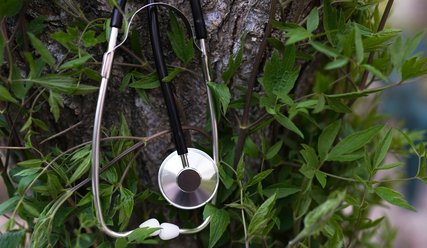Family of doctors; Father and son Tim and Richard Medlicott
Friday 19 May was World Family Doctor Day (WFDD) – an occasion to highlight the vital role and contribution of family doctors and primary care teams in healthcare systems worldwide. The annual celebration recognises the central role of family doctors in delivering personal, comprehensive, and continuous health care to patients.
The 2023 theme was ‘Family doctors: The heart of healthcare.’
What better way to delve into this subject than to talk to two family doctors, who are family: Father and son Tim, (Mornington Health Centre Dunedin) and Richard (Island Bay, Wellington) Medlicott who have over 75 years experience between them providing medical care to families in Aotearoa New Zealand.
Well, I guess a good place to start is if you could both tell me about your journeys into the profession?
Tim: I was brought up in Waverly, South Taranaki. We had other members of our extended family who were also medical professionals including my Grandmother’s brother Ralph Simmons who was a family doctor in Patea.
I was educated at Wanganui Collegiate School and at The University of Otago, graduating in 65, I started as a house surgeon. It was actually one of the GP surgeons in ENT who said to me, ‘Hey, why don't you come and join me in general practice?’ And I said, ‘Yeah, why not (laughs)?’
So, when I finished my training, I joined him in Mornington. He was a solo practitioner. My introduction to general practice and my training, just to show you how different training is these days, was I went in the door on the 1st of January and he gave me the keys and said, I'll see you in three weeks - I'm on holiday. I must have been doing something right because by the end of two years I had three and a half thousand patients!
Richard: For me I was doing locum work in the UK, having followed my wife to be there. I didn’t have firm plans, but had enjoyed general practice as a student, and had won the GP prize in my 6th year. Another SHO suggested I apply for the GP training scheme, and I thought ‘Yeah, why not, might as well!’ Training was very different to my fathers, two years post graduate house officer roles, then two years in SHO rotations with a half day GP training group each week, and then a year as a GP registrar. MRCGP at the end of that.
With a heavy workload like that, what did you both do to manage work/life balance and taking care of your own families?
Tim: The difficult but important thing for me was finding time for family. And I think Richard would be able to tell you whether I succeeded or not.
Richard: I think you did. You were also just one of those people who always liked to be busy, so even when you weren’t working, you had projects on the go or family stuff happening.
I do have a little tool that helps me. I’m fortunate to live quite close to my practice on the South Coast of Wellington, so I either walk or bike to work, and on my way home, when I come over the little rise in the hill of my street, I can suddenly see the South Coast and ocean. And if there's a breeze suddenly you get the ocean smell coming through and that's my signal to set my work aside, and switch into home mode.
Tim: I agree that the switch off thing is really, really important. One of the problems I had with that is that I did obstetrics, so I had to be on call 24 hours a day, seven days a week for delivering babies. I found keeping busy helped me to switch off. Personally, I needed to immerse myself in another project so I would not think about medicine. Interestingly, after I retired, I started dreaming about patients. I never ever dreamt about patients while I was working. I don't know why that is, but clearly those things just sort of linger away in the back of your brain and eventually need sorting out.
What are some of the things you think are important when caring for families?
Richard: Well, there’s a focus on holistic care and longitudinal care. When you’re working with a family you come to understand their dynamics often through many generations. This is such an important and rewarding part of our role.
But I guess one thing I’d point out is that if you’ve got a family, you’re lucky. I know there are some toxic families out there, but there are also a lot of Eleanor Rigbys – lonely, disconnected people. Social disconnection is a big pressure on primary practice. There are NGOs out there trying to help, but often it seems like the default position is to tell people to talk to their GP, and while we can counsel patients, we’re not counselors.
I really like the programme now that we've got now with the health improvement practitioners who can help patients out with that stuff. That leaves us more time to focus on being skilled physicians.
What are some of the challenges caused by an aging population?
Richard: Well, I’ve noticed that people are going into residential care facilities a lot later in life and so you're left managing that complexity in the community. But there's also a lot of processes and systems for getting home care in place that I didn't have 25 years ago.
I'm sure it was really complex in your day too, Dad?
Tim: Yes, but in the early years we didn't have the therapeutic options that you have now. Sometimes, you know, the wheels just fell off and there wasn’t much more you could do. I think that’s been the biggest change from when I started to where you are at today.
What are some of the things that made being a GP fulfilling for you?
Tim: Delivering babies. It was mind-blowingly wonderful. And it was part of the empathy you developed with a family. It was just seeing them from cradle to the grave. One time I also successfully treated a cardiac arrest on the consulting room floor – that almost never happens so it’s certainly something I’ll never forget.
I also loved seeing young kids who come in and make your day by running across the room to sit on your knee. It's a wonderful feeling.
Richard: There are many little rewards; the connections you make with people, helping the person who was depressed, and is now no longer depressed, the big squamous cell carcinoma you chop out and you close up perfectly. It varies from the practical to the emotional rewards of helping someone through a rough time.


